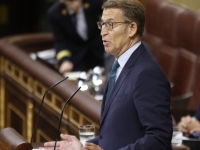Politics
The King of Spain will resume contacts to propose a candidate for Prime Minister
After a new failure of Núñez Feijoo
USPA NEWS -
As expected, the conservative candidate for Prime Minister of Spain, Alberto Núñez Feijoo, did not obtain the confidence of Parliament in the second vote held this Friday. A simple majority was enough for him, but he did not achieve it. He received 172 votes in favor, compared to 177 against. The conservative candidate considered that, despite not obtaining the support of Parliament to be sworn in as President of the Spanish Government, the attempt “was worth it.” A new period now opens: King Felipe VI will begin on Monday a new round of contacts with the representatives of the political parties, to propose a new candidate who will, in all probability, be the socialist candidate and current acting Prime Minister, Pedro Sanchez.
The spokespersons for the Catalan and Basque independence parties will not attend his meetings with the King, precisely those who can give the Presidency of the Spanish Government to Pedro Sánchez. Felipe VI could, therefore, not propose any other candidate and call legislative elections. Or he can propose the socialist candidate, whose election is not assured. This same Friday, the Catalan Parliament agreed to demand from Pedro Sánchez a written commitment on holding an independence referendum in Catalonia, as a preliminary step to supporting his candidacy.
The problem is that, under current laws in Spain, the acting President of the Government and socialist candidate for re-election cannot sign that commitment. The analysts' doubt is whether, when push comes to shove, the Catalan and Basque independentists will maintain their order against the Socialist Party. The spokesman for the Catalan socialists, Salvador Illa, warned this Friday that the demand of the independentists leads to a repeat election which, in any case, poses a risk because the majorities achieved could be lost.
King Felipe VI will announce his decision next Tuesday. If he proposes Pedro Sánchez as a candidate for Prime Minister, the new investiture debate will be held in the second half of October. In any case, Spain must have a Government before November 27. If that day arrives without a Prime Minister elected by Parliament, the elections would automatically be called for January 11, 2024.
Before that, Spain faces an ungovernable future. If Pedro Sánchez obtained the confidence of Parliament to repeat his term, the absolute majority of conservatives in the Senate could make the approval of the Government's laws impossible. For many analysts, the question is not if Spain will hold a repeat election but when there will be one. Spain is heading into a period of political instability that will have economic consequences, analysts warn. And that will have repercussions in Europe because Spain is the third economy in the European Union.
Liability for this article lies with the author, who also holds the copyright. Editorial content from USPA may be quoted on other websites as long as the quote comprises no more than 5% of the entire text, is marked as such and the source is named (via hyperlink).






